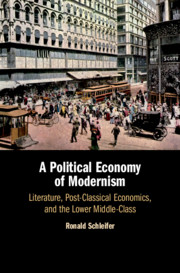Book contents
- A Political Economy of Modernism
- A Political Economy of Modernism
- Copyright page
- Dedication
- Contents
- Preface
- Acknowledgments
- Chapter 1 Methodological Prologue
- Part I Economics in the Context of Cultural Modernism
- Part II Intangible Assets: Modernist Economics
- Part III Intangible Liabilities: Class and Value in the Time of Modernism
- Works Cited
- Index
- References
Works Cited
Published online by Cambridge University Press: 13 October 2018
- A Political Economy of Modernism
- A Political Economy of Modernism
- Copyright page
- Dedication
- Contents
- Preface
- Acknowledgments
- Chapter 1 Methodological Prologue
- Part I Economics in the Context of Cultural Modernism
- Part II Intangible Assets: Modernist Economics
- Part III Intangible Liabilities: Class and Value in the Time of Modernism
- Works Cited
- Index
- References
- Type
- Chapter
- Information
- A Political Economy of ModernismLiterature, Post-Classical Economics, and the Lower Middle-Class, pp. 293 - 308Publisher: Cambridge University PressPrint publication year: 2018



